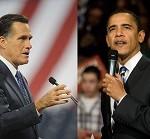The most important election in the world, the U.S. election, is in a dead heat with incumbent President Obama with a statistically insignificant lead of 1% or 2% depending on which polls are consulted. And the result may not be final for many weeks after voting day on 6th November because both sides are readying an army of lawyers to challenge the count on a constituency-by-constituency basis.
It used to be the conventional wisdom that the economy – and more specifically “jobs” – determined who won the U.S. Presidential elections. By this reckoning the challenger, Republican Mitt Romney, should be the clear winner since the unemployment rate has remained almost unchanged at 7.9%. The 2% rate of growth in the last quarter is only marginally worse than when Obama started his term in January 2009. The need to simplify everything into sound bites for television has resulted in large parts of the electorate forgetting that Obama took over an economy entering the longest recession since the Great Depression of the 1930’s, trillions of dollar in debt caused by tax cuts for the wealthy, and two wars in the Middle East.
The reality is that Obama has done a good job of preventing the economy from sliding into a Europe-style deep-depression, saved the financial system from collapse and the automobile industry from bankruptcy. Moreover he has instituted, for the first time, a universal health care system derided by Republicans as Obamacare as if the poor do not deserve to be cared for in the richest country in the world.
On the external front Obama has managed the relative decline of the U.S. from its prominent position of the 1990’s with some dignity. The withdrawal from Iraq has been completed and the 2014 deadline for withdrawal from Afghanistan is on track – and uncontested even by Romney. By all counts the anger and rejection that former President George H. W. Bush aroused, especially in Europe and the Arab world, has subsided to the extent that the U.S. has managed to exercise some influence in the exploding Arab world. Unfortunately the policy on Iran remains confrontational, goaded by Israel, and even the killing of Osama Bin Laden under his watch has not, however, given him the bounce that it would have in a better performing economy. As far as India is concerned both candidates are pledged to continue to strengthen the bilateral.
The contest is so close, that for the first time a new factor has crept in and that is the quality of the candidates’ performance in the three television debates. So lacklustre was Obama’s performance in the first debate that according to one poll his popularity rating fell from eight points ahead of Romney to three points behind. Although he was able to claw his way back up in the two subsequent debates, if Obama loses, the debates will have been one of the causes.
So capricious is the American electoral system that even winning the popular vote is not enough, as Al Gore found out in November 2004. His Republican challenger, George W. Bush, was proclaimed the winner on account of the 29 votes assigned by the Electoral College to the State of Florida. In order to win, a candidate must get 270 of the Electoral College’s 538 votes. Obama is assumed to have secured 201 votes from declaredly democratic states such as California, New York, etc. Romney can assume 191 votes from the South and the Midwest such as Texas, Oklahoma, etc. That leaves both candidates vying for the remaining 146 votes from the “swing” states of Ohio, Florida etc. Although Obama has a slight lead here, his chances are being bolstered by the indefatigable campaigning of former President Bill Clinton.
And finally nature, never mentioned in the campaigns, may come to the rescue of beleaguered President Obama. Super storm Sandy has caused such devastation that the Independent mayor of New York, Michael Bloomberg, endorsed Obama for the actions he has taken to address climate change. Even arch conservative Governor of New Jersey, Chris Christie, praised him for how he dealt with the aftermath of the storm.
With all the idiosyncrasies of the U.S. political system, they are fortunate in not being saddled with Indian-style messy coalition governments – a sure outcome of such a close election.
Neelam Deo is India’s former ambassador to Denmark and Ivory Coast, and served in Washington and New York. She is the director and co-founder of Gateway House: Indian Council on Global Relations.
This article was originally published by Business Standard, on November 5, here.
This article was exclusively written for Gateway House: Indian Council on Global Relations. You can read more exclusive content here.
For interview requests with the author, or for permission to republish, please contact outreach@gatewayhouse.in.
© Copyright 2012 Gateway House: Indian Council on Global Relations. All rights reserved. Any unauthorized copying or reproduction is strictly prohibited.


